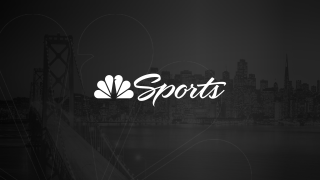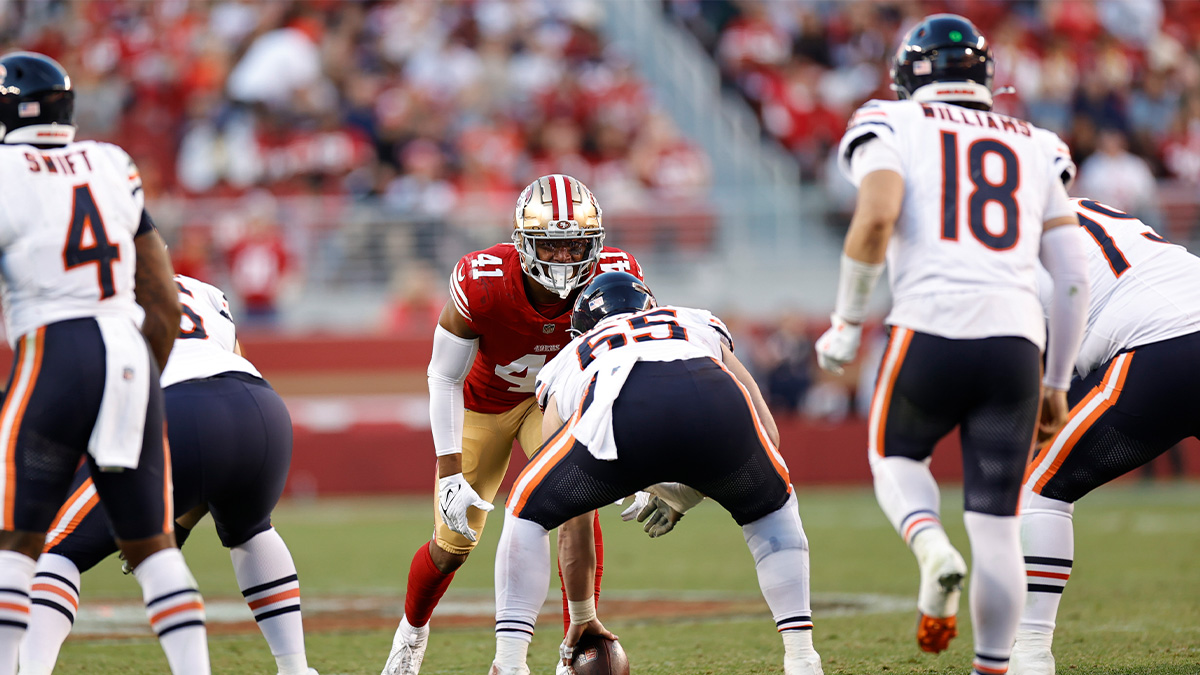
INDIANAPOLIS -- The 49ers do not appear confident they can fill their massive need at pass rusher with someone who is currently not on the team’s roster.
After all, pass rushers are becoming more and more like quarterbacks. There are few – if any -- sure things in the draft. And once a team gets a good one, they rarely let him go.
General manager John Lynch revealed the 49ers spent a lot of time last year working on scheduled free agents Chandler Jones, Melvin Ingram and Jason Pierre-Paul. Those pass-rushers never made it to the open market, as the Cardinals, Chargers and Giants utilized their franchise tags before reaching long-term extensions.
Stay in the game with the latest updates on your beloved Bay Area and California sports teams! Sign up here for our All Access Daily newsletter.
The Detroit Lions have already taken Ezekiel Ansah off the market with the franchise tag, and the Dallas Cowboys have signaled their intention to retain DeMarcus Lawrence, too.
“A big focus for us is to tap into that ability we already have,” Lynch said at the NFL Scouting Combine.
The 49ers need plenty of help for a defense that ranked tied for 26th in the league with just 30 sacks. The organization feels as if it has already added three pass-rushers they did not have for the entire 2017 season.
Cassius Marsh: A fourth-round pick of the Seattle Seahawks in 2014, Marsh did not register the first sack of his NFL career until his third season. He was shipped to New England in a trade last year, but the Patriots cut him after he’d played in just nine games.
San Francisco 49ers
Find the latest San Francisco 49ers news, highlights, analysis and more with NBC Sports Bay Area and California.
In six games with the 49ers, Marsh recorded two sacks and quickly surpassed Aaron Lynch on the team’s depth chart. John Lynch said he believes Marsh fit well into the 49ers’ defense at the Leo position. The club signed him to a two-year extension last month that will pay up to $7.7 million with $3.1 million guaranteed.
“He played well for us,” John Lynch said. “When guys play well and we can see a future for him, we’re going to do our best to sign him and we did a deal that I thought was fair for him and fair for us.
“Now it’s incumbent upon him, just like every other player, to go make that happen. But we’re pleased to have him a part of us, moving forward.”
Pita Taumoepenu: The 49ers really like Taumoepenu, whom the club selected in sixth round of last year’s draft. But you might not know it, because he suited up for only two games as a rookie. Taumoepenu continued to work hard behind the scenes last season, and the 49ers took notice of the improvements he made as the season progressed.
“Sometimes people read into the fact that he wasn’t getting active, that he wasn’t making progress,” Lynch said. “He progressed tremendously. We’re really excited about him. We remain excited about his opportunities.”
Eli Harold: There is little evidence that Harold can fill a void in the 49ers’ defense with his pass-rush ability. He played the strong-side linebacker position and typically came off the field on third downs.
But the 49ers have reason to believe Harold can be an asset as a pass rusher. The belief within the organization is that Harold has one great pass-rush move and he just needs to refine his arsenal to become a major factor.
“We think Eli has some skills,” Lynch said. “We felt like he made great progress at Sam linebacker spot, but we do believe he has some rush ability that’s untapped. We have to tap it. We’re going to give him that ability.”
The 49ers will continue to give the pass rushers from the current draft class a hard look. The problem is there do not seem to be many good options.
Here is a look at the group considered to be the top four options at the 49ers’ edge-rusher position:
Bradley Chubb, North Carolina State
Size: 6-4, 269
Speed: 4.65 seconds
Strength: 24 reps (bench press)
The only problem in analyzing Chubb’s potential fit with the 49ers is that he is expected to be long gone by the time the 49ers go on the clock with their first pick in the draft. The Indianapolis Colts – or any team outside the top three – could target Chubb.
He has it all, winning the Hendricks and Bronko Nagurski awards as college football’s best defensive end and best defender. He had 26 tackles for loss and 10 sacks in his final college season.
Chubb described himself: “Just high motor, high energy, passionate, just a guy who’s going to get after their quarterback, get after the guy with the ball. Whoever has the ball in their hands, I’m running down 50 yards down the field just to get that ball.”
Harold Landry, Boston College
Size: 6-3, 252
Speed: 4.64 seconds
Strength: 24 reps (bench press)
The 49ers were the first team to sit down with Landry for a formal, 15-minute interview. It is not out of the question they could call his name with the No. 9 overall pick.
“I would definitely love to play with the 49ers and their defense,” Landry said. “Meeting with their coaches — great coaches, great guys and it would be an honor to go to San Fran and play for them.”
After recording 16.5 sacks in 2016, an ankle injury limited his effectiveness. He still recorded five sacks
“I think that nobody in this class has a first step like mine, the bend like mine and the burst to the quarterback like me,” Landry said. “I am not saying I am perfect. There are plenty of things I can improve on in my game, but in this draft I do believe I am the best pass rusher.”
Marcus Davenport, Texas-San Antonio
Size: 6-6, 264
Speed: 4.58 seconds
Strength: 22 reps (bench press)
Davenport is probably not the exact fit the 49ers need as an outside pass rusher. He has immense physical ability, but he is raw, did not play against top-flight competition, and might not have the acceleration to get around the edge.
But there is one thing he does that fits what defensive coordinator Robert Saleh envisions. Saleh has repeatedly stated desire for “extreme violence” from his players.
“I think I’m real violent,” Davenport said at the combine. “I think that’s a real attribute that I have.”
Arden Key, LSU
Size: 6-6, 238
Speed: Did not run
Strength: Did not lift
There is no questioning Key’s physical skills, but there’s plenty other elements that could make teams reluctant to invest heavily in his future. He played primarily in a 3-4 scheme, but his pass-rushes came in a three-point stance.
Key left the LSU program in the spring of 2017 for personal reasons. He came back approximately 30 pounds overweight. Why? He said he ate too much.
He said of his meetings with teams, “Just to be in there, explain myself to them, just explaining to people who I am and what I went through. I’m past that and I’m still standing, and I’m still here.”
When asked what he went through, Key answered, “No comment.”


